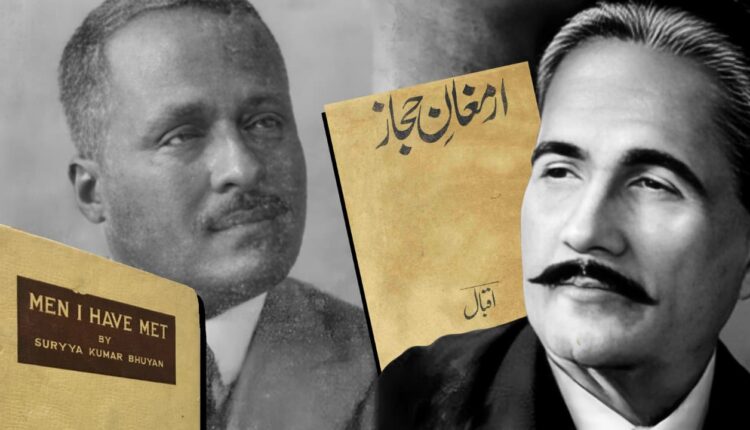Dr. S.K Bhuyan and Allama Iqbal – when two literary legends met
by Muhammad Talha Amin Baruah
Dr. S.K. Bhuyan and Allama Iqbal are two towering figures in South Asian literature, each shaping their cultural landscapes profoundly. Bhuyan, a distinguished historian and writer from Assam, was known for his dedication to preserving regional heritage. Allama Iqbal, revered as a philosopher-poet, inspired generations through his profound poetry and vision of selfhood and freedom. Did you know that both these legends actually met once? Their meeting symbolizes a unique confluence of regional history and pan-Islamic intellectual thought.
Rai Bahadur Surya Kumar Bhuyan (1892–1964) was a distinguished writer, historian, educator, social activist, politician, professor, and poet from Assam. He authored numerous works encompassing ancient history, stories, essays, and biographies, significantly contributing to the preservation of Assam’s rich history. Bhuyan served as a member of the Rajya Sabha during 1952–53 and was honored with the Padma Shri by the Government of India in 1956. He meticulously compiled and edited several books and articles in Assamese. He also authored works in English and Bengali, cementing his legacy as a versatile and influential literary figure.
Allama Iqbal or Sir Muhammad Iqbal (1877–1938) was a renowned Islamic philosopher, politician and poet. His Urdu poetry Is considered among the greatest of the 20th century, and his vision for the cultural and political identity of Muslims in British India played a key role in Reformation of society. Known by the honorific title of ‘Allama’ (the learned). Iqbal is regarded as one of the most influential Muslim thinkers and Islamic philosophers of his time. His early poetry, written up to 1905, reflects deep patriotism and also honors iconic Indian figures like Shri Ram and Guru Nanak.
When Dr. S.K. Bhuyan of Assam met Allama Iqbal in Lahore in 1928, it was more than a passing encounter — it was the convergence of two towering intellects. One preserved the chronicles of India’s past, the other envisioned its spiritual awakening. Their meeting symbolized the harmony of regional scholarship and universal philosophical thought.
There is a lesser known instance when both of these literary legends met. Dr. S.K Bhuyan wrote in his book ‘Men I Have Met : Brief Sketches of One Hundred and Fifty-two Contemporaries’ (1962) that he once met Allama Iqbal – “On November 20, 1928, I had the good fortune of meeting Sir Muhammad Iqbal, poet and philosopher, at the tea-party given to the delegates of the Fifth All-India Oriental Conference at Shahdara Gardens attached to the mausoleum of Emperor Jahangir at Lahore. Sir Muhammad referred to my articles in the ‘Islamic Culture’, and expressed a desire to see the entire ‘Padshah-Buranji’ in English.”
The same things were mentioned by Bhuyan in his english translation of Padshah-Buranji known as ‘Annals of the Delhi Badshahate’ (1947). He further writes in the preface of the book – “The encouragement given to me by Professor Khuda Bukhsh, Mr. Marmaduke Pickthall, Sir Muhammad Iqbal, and the authorities of the Islamic Culture, constitute an unforgettable chapter of my life redeeming the arid exertions of a historical researcher in this lonely corner of India.”
As Bhuyan previously mentions that Allama Iqbal praised his articles which were published in the ‘Islamic culture’ quarterly magazine, we assume that it must have been the article ‘New lights in Mogul India from Assamese sources’ by Dr. S.K Bhuyan, which was published in Islamic culture vol. 2 (1928), Government Central Press, Hyderabad Deccan. Bhuyan added a note In this article “The distinguished authority on Islamic culture and civilisation at once saw the value of the book, which represents Assam’s contribution towards the re-construction of the history of Islamic India and I owe this paper to his (Sir Khuda Baksh’s) kind suggestion and encouragement.”
In the preface to Annals of the Delhi Badshahate (1947), Bhuyan humbly acknowledged Iqbal’s inspiration. For a historian working from the “lonely corner of India,” Iqbal’s words became a source of strength — proof that true scholarship transcends borders, languages, and faiths.
When S.K Bhuyan’s work ‘Annals of the Delhi Badashahate’ was published, the very next year the Islamic culture magazine published a positive review of the work. The article praises Bhuyan’s work and dedication, as well as the historical richness of the land of Assam. The review was published in Islamic Culture Volume XXII – Nos. 1-4 (1948), The Islamic Culture Board, Hyderabad Deccan.
Dr. S.K. Bhuyan’s works focused on preserving and documenting historical events from a regional and broader South Asian perspective. While his main emphasis was on Assam’s history, his scholarly approach supports the preservation of diverse cultural and historical narratives, including Islamic India’s history. His collaboration with figures like Allama Iqbal highlights a shared commitment to safeguarding the rich heritage of India.
…… Ends…
When Iqbal appreciated Bhuyan’s research on Mughal India from Assamese sources, he validated the idea that every region holds a vital piece of the subcontinent’s grand mosaic. The poet’s acknowledgment of Bhuyan’s work was also a tribute to India’s cultural diversity and its interconnected historical memory.


Comments are closed.